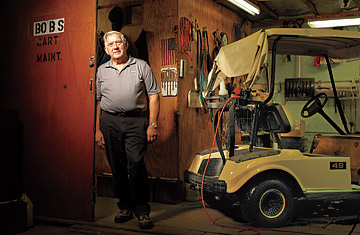
Robert Shively, 68, worked in a chemical plant for 36 years, but that didn't earn him an easy retirement.
(3 of 8)
The idea that we could ever save enough to pay for 30 years of leisure is a relatively recent invention. An entire profession, financial planning, is dedicated to telling people they can, and must, pay for their own retirement. A 401(k) is usually a central part of those plans. Even for people who don't have enough money to send their kids to college or buy a home, building their 401(k), they are told, is their first priority. It's not terrible advice. The accounts grow tax-free, though you have to pay Uncle Sam's levy when you cash out. Unlike health coverage, you don't lose your 401(k) when you lose your job. And once you set the account up--a minor task at most companies--it's automatic, making it an easy, thought-free way to save. Indeed, Americans have more saved specifically for retirement than ever before. But the past year has shown that even with our added savings, we are at much greater risk today of our bank accounts running empty than when employer-guaranteed pensions were the norm. By Munnell's calculations, 44% of all Americans are in danger of going broke in their postwork years.
A Brief History of the 401(k)
Congress was trying to close a loophole on executive bonuses when it created the 401(k). Most companies intended 401(k)s--which were originally called salary-reduction plans but then renamed for the portion of the tax code that makes them possible--to be a perk for highly paid executives, not a pension replacement. That's because lower-paid employees probably could not afford to defer a portion of their paychecks. So companies held on to their pension systems even as they added 401(k)s, which by law they had to make available to all employees. When the market took off in the 1980s, the rank and file clamored to get in.
With a 401(k), contributions came out of your pay but were not taxed, and you had control of them. Contributions could be added or suspended. Best of all, when you left your company, your 401(k) traveled with you, removing a penalty for switching jobs that had been built into the pension system. On the corporate end, a change in accounting rules made the growing cost of pensions more apparent to shareholders. Cutting the pension was a guaranteed way to improve the bottom line. The rise of the 401(k) began.
Around the same time, Occidental was having problems. In the late 1960s the company bought Hooker Chemical Co. in a effort to diversify. But in the 1970s, allegations surfaced that toxic waste that Hooker dumped into the ground during the 1940s and early '50s was causing severe health problems in Niagara's Love Canal neighborhood. Oxy Pete needed cash to shore up this and other problems, and its CEO, Armand Hammer--flamboyant, powerful and ultimately corrupt--came up with a solution: raid the retirement kitty. Amazingly, this was legal at the time, and Hammer wasn't alone in doing it.
